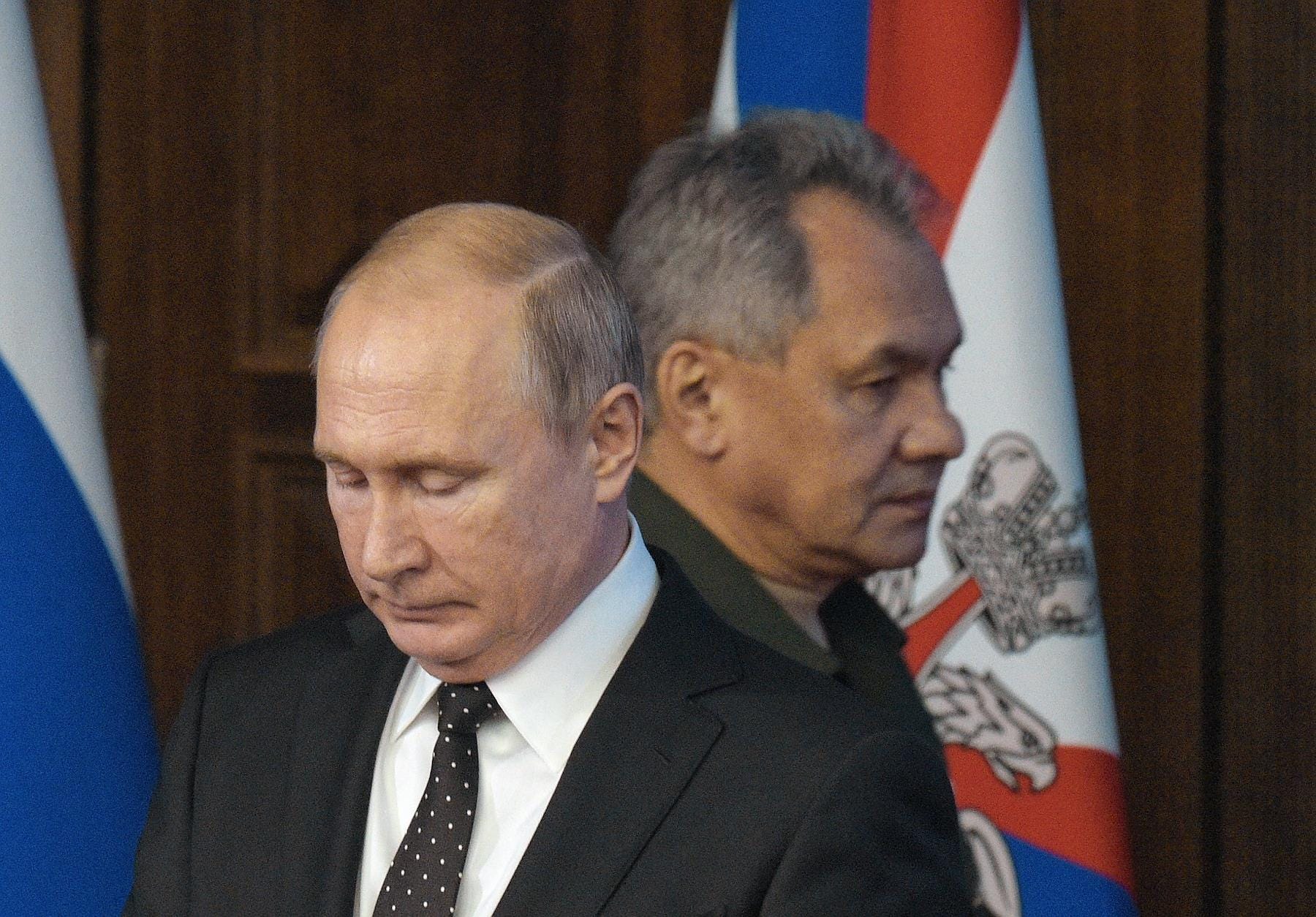
The way in which Russian Defense Minister Sergei Shoigu was replaced last week with little-known economist Andrei Belousov was characteristic of President Vladimir Putin’s way of operating. Not only was it unexpected (particularly given that Russia currently has the upper hand in Ukraine), but it was carried out in total secrecy.
Dear subscribers, since the beginning of the war in Ukraine we have very limited options to earn money for our work. You can help our small editorial keep doing independent journalism on PayPal or Patreon.
Why demote Shoigu?
Our sources suggest there were at least two reasons why Putin decided to ditch Shoigu, 69, the longest-serving defense minister in modern Russian and Soviet history:
Shoigu wanted to be involved in directly commanding troops. This was likely irritating for Putin, who is himself involved in military decisions, and in close contact with the General Staff. Belousov, 65, will not be involved in the planning of military operations, according to a source close to the government. “The appointment of Belousov is all about making things easier for Putin. He’s not the sort of defense minister who is going to make decisions about, for example, mobilization,” said the source.
Shoigu has been made the fall guy for military corruption, and the serious problems with supplying the army. Pro-war propagandists and nationalist commentators constantly complain about shortages, and the poor quality, of equipment and medical supplies. Even Putin has acknowledged that there are not enough drones, or communication equipment.
Corruption in the Defense Ministry was recently highlighted by the arrest of two high-ranking officials. Deputy Defense Minister Timur Ivanov, a close ally of Shoigu known for his expensive tastes, was arrested in April, and is accused of receiving billions of rubles in bribes. Just days after Shoigu’s departure, Yuri Kuznetsov, the head of the Defense Ministry’s main personnel directorate, was detained on corruption charges. “I’m sick of this disorder,” said one senior official involved in mobilization and supplying the army.
The demotion of Shoigu is a big step for Putin as the veteran minister has traditionally been considered one of the president’s close confidantes. At the beginning of the 2000s, Shoigu helped Putin become president, and was subsequently known as someone Putin took with him when holidaying in remote parts of Siberia. Shoigu’s star, however, has waned amid the war in Ukraine – particularly as a result of a public conflict with the leader of Wagner mercenary company Yevgeny Prigozhin (even though Putin ultimately took Shoigu’s side).
This is not Putin’s first attempt to improve the way the army is provisioned. Since the full-scale invasion in February, 2022, Putin has changed the deputy defense minister in charge of material and technical support of the armed forces three times. And, in the fall of 2022, he set up a special body – headed by the prime minister – with oversight over arms, food, clothing and medical care. It was designed to switch the economy to a war footing, and overhaul military supplies and infrastructure (and appears to have been a failure).
Economist at the helm
Putin’s offer to run the defense ministry was a shock for Belousov. It’s well-known Belousov has a difficult relationship with Prime Minister Mikhail Mishustin, and there were rumors in recent weeks that he could be moved from his position as first deputy prime minister, and appointed as a university rector, or to head a body like state development corporation VEB.RF. However, Putin decided on a promotion. After speaking with our sources, it’s clear that there were several reasons:
Belousov’s total loyalty to Putin, and the system. “Putin is almost a God for him. He’s absolutely devoted,” said one source.
His track record of delivering. Back in 2013, for example, Belousov was put in charge of improving Russia’s position in the World Bank’s Doing Business rating. At the time, Russia was in 111th place, but by 2020 it had reached 28th (admittedly, the following year, the World Bank discontinued the rating).
Belousov is not a member of any of Russia’s influential clans. Fearing a coup, Putin always tries to avoid making any one clan too powerful.
Unlike many in the Russian elite, Belousov has a reputation for incorruptibility. The team around deceased opposition leader Aleksei Navalny have never investigated Belousov, and he has not been implicated in any corruption scandals. “He’s a decent and honest person who respects his colleagues,” said one top government official.
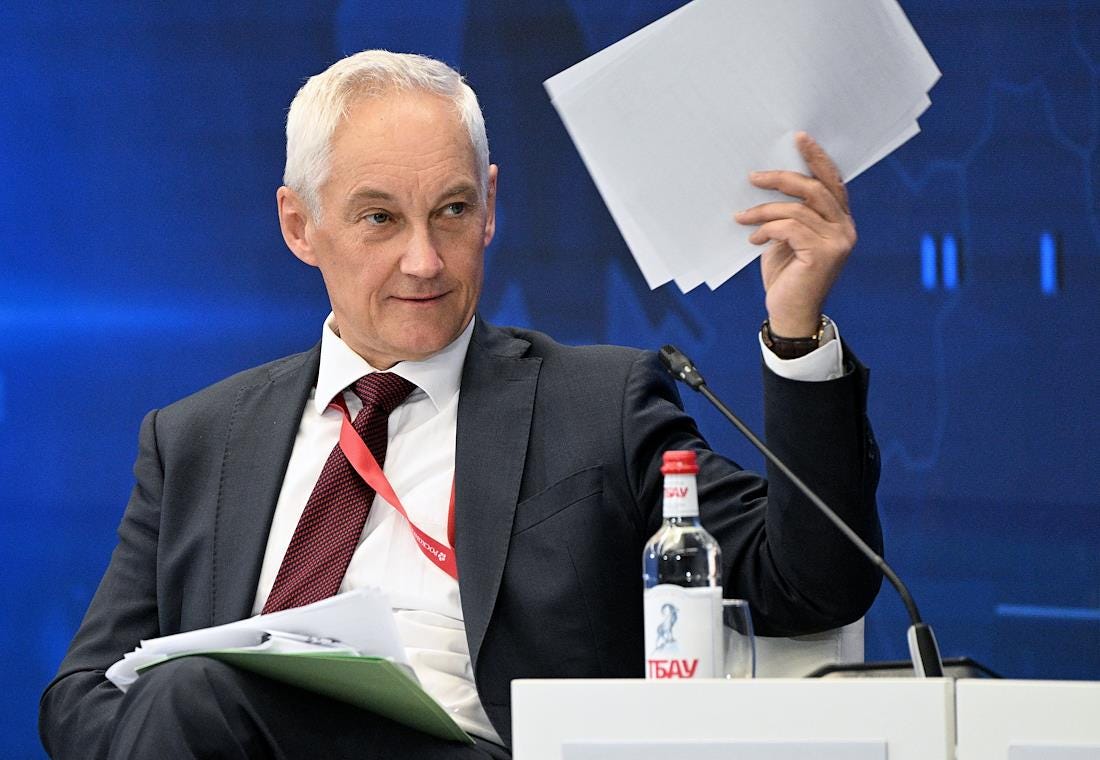
Putin himself gave two reasons for picking Belousov: to make the Defense Ministry more technologically savvy, and better manage the money the Kremlin is spending on the war.
According to the Russian budget for this year, 14.2 trillion rubles ($154 billion) is earmarked for the army and other security agencies. That’s about 8 percent of GDP (a record for modern Russia). At a meeting with his generals last week, Putin even admitted he was concerned about repeating the fate of the Soviet Union when high defense spending contributed to economic collapse. However, there is a way to go before Russia reaches this point (in the late Soviet period, annual defense spending was about 13 percent of GDP).
When it comes to money, Putin has long shown that he prefers to appoint competent professionals, rather than close friends or those with few qualifications. Anton Siluanov at the finance ministry and Elvira Nabiullina at the Central Bank are obvious examples. Seen in this light, the appointment of Belousov is logical. “It’s not a bad choice by Putin,” said the source close to the government. “He [Belousov] is stubborn, loyal and conscientious.”
Changing course
When he was Putin’s economic aide, Belousov occupied a Kremlin office once used by Soviet leader Leonid Brezhnev. A map of the Soviet Union from that period remained hanging on the wall, and the décor was one of stuffy Soviet apparatchik.
In many ways, this style reflects Belousov’s political and economic convictions. An advocate of Keynesian economics, he believes the state should take an active role in the economy. “I am a liberal,” he said in 2012. “But economic policy should be tailored for the times. In some situations, it’s essential for the state to get involved, and in some spheres, the state’s presence should be expanded.”
However, it’s an open question how effective Belousov will be at the Defense Ministry. He does not have any experience of running such an enormous and unwieldy organization. One former colleague said Belousov’s time as a government minister (2012 to 2013) showed his unsuitability for the task. “His work at the Ministry for Economic Development was a failure: he destroyed everything he had inherited… he didn’t build anything and left after a year,” said the ex-colleague.
Corruption is also an integral part of an organization like the Defense Ministry, and Belousov will find it extremely hard not to get sucked in. “The system will grind him down. The system is always stronger,” the former colleague said.
While many observers claim Belousov’s appointment shows Putin is settling in for a long war in Ukraine, our sources disagreed. “When the war ends, and how long it lasts for, does not depend on Belousov,” pointed out the head of one state-owned company.
Economic backdrop
At present, the Russian economy is growing at its fastest rate for more than a decade, and there is no doubt that a large part of Belousov’s job will be to ensure that the money this generates is spent effectively. The Kremlin has plenty of cash to continue the war in Ukraine, and it wants the best possible return on its “investment.”
Amid sky-high defense spending, Russian GDP growth hit 3.6 percent last year, and this year it is expected to be 3.2 percent (according to International Monetary Fund forecasts). This level of growth (which some analysts believe puts the economy in danger of overheating), has helped push up real incomes for Russians (according to official data, they have risen 10 percent in two years). At the same time, inflation is high (currently at 7.9 percent), the Central Bank is considering raising interest rates above their present level of 16 percent, and there is a severe labor shortage.
The war and Western sanctions have helped turn the Russian economy into a closed ecosystem that is awash with cash, economist Oleg Vyugin said in a recent interview. “Russia continues to receive revenue from energy exports. But capital outflows have collapsed. As a result, Russia has a lot of money.”
In for the long haul
Aside from Shoigu, Putin has not made any other major changes to the government’s line-up as he embarks on his fifth presidential term. As many of our sources predicted, Prime Minister Mikhail Mishustin retained his post. Other changes were cosmetic, or a logical consequence of the removal of Shoigu, who will now head the Security Council.
All this strongly suggests that major staffing appointments or dismissals are unlikely in the near future, and that Putin now thinks he has an effective top team in place. One senior official told us he believes that, after the replacement of Shoigu, there will be no big more changes in government until the end of the war in Ukraine.
Translated and edited by Howard Amos




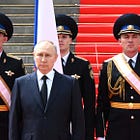
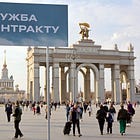

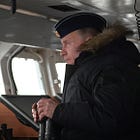
Shoigu was moved UP.
"little-known economist Andrei Belousov" has long been a rising star.
We can all draw our own conclusions on the rest of the piece from sentence 1.
"Severe labor shortage" puts a hard ceiling , a limit to all the economic. news. Happily for Russians, wage increases now exceed inflation by a huge amount. However. guest workers from former Soviet republics no longer arrive in any significant numbers. Long term , it will only get worse .as the demographic free-fall accelerates . Women fill jobs which were formerly a man's job., Moreover, how many 19-35 year old birthing age women are there , compared to ten years ago ? 40%? 30%?